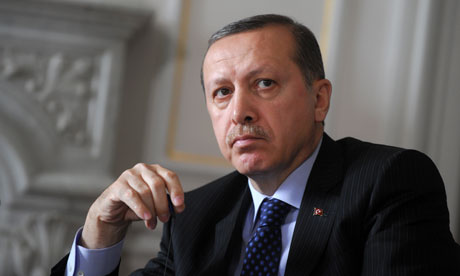The Turkish prime minister revealed the iron fist in his velvet glove this summer, but of which is his true character built?

The world saw Recep Tayyip Erdogan’s dark side this summer, with his brutal tactics in quelling protests in Turkey. Photograph: Nikolay Doychinov/AFP/Getty Images
All summer long, Recep Tayyip Erdoğan has been in a very bad mood. The public squares and parks of Istanbul and several other Turkish cities were taken over by protesters he angrily dismissed as “riff-raff”, turning the full coercive power of the state on the largely peaceful demonstrators.
The riot police and indiscriminate use of teargas – including on children, women and the infirm – tarnished the Turkish prime minister’s image. He wrecked his own international standing. And he damaged his own domestic political ambitions.
On Monday in Ankara, a rather different Erdoğan was on view, although no one is quite sure which one is the real prime minister. He gave a glimpse of his former self long disappeared from view, the most reformist and liberalising head of government seen since Mustafa Kemal Atatürk, the republic’s founder. Seldom predictable, Erdoğan went some way to confound his critics, suggesting that his summer bark was a lot worse than his autumn bite.
The prime minister’s big package of reforms comes ahead of important local and presidential elections next year. So Erdoğan’s first aim on Monday was about retaining maximum power for his Justice and Development party (AKP). That might explain the most concrete pledge he made — headscarves will be allowed for female civil servants and MPs, he vowed. That’s progress for democratic rights and a major blow to the secularists who dominated Turkey‘s pre-Erdoğan decades.
The move was aimed at shoring up his own conservative Muslim constituency, the voter base that has given him a hat-trick of election victories over a decade. This is also about settling old scores in the culture wars that continue to engulf Turkey. A thread running through Erdoğan’s extremely angry speeches since the summer has highlighted the old grudges he continues to bear against the “Kemalist” elite whose power he has throttled.
The other main thrust of the reforms concerned the Kurdish question. Here the prime minister was more halfhearted, perhaps half-baked, calculating he was giving enough to keep a year-old peace process with the PKK guerrillas of the Kurdistan Workers party alive, while not conceding too much. Fed up with what they saw as a prime minister refusing to deliver on his side of the bargain, the PKK has been threatening for weeks to halt withdrawing its fighters from Turkey into neighbouring Iraq and to abandon the ceasefire it called in the spring.
Until now, Erdoğan had given nothing. On Monday he still refused to yield on the fundamental Kurdish demands of education in their own tongue and devolution of central government powers to the regions. But there were also real concession to the Kurds: the scrapping of Turkish nationalist school incantations that Kurdish children have to intone every day; the likelihood of bigger and easier Kurdish representation in the Ankara parliament; Kurdish parties allowed to campaign in their own language and to benefit more easily from state funding.
There were disappointingly large lacunae in what Erdoğan offered. No reform of the draconian catch-all anti-terror legislation that, among other things, has been abused to make Turkey the world’s biggest jailer of journalists. Most significantly, there was nothing to dampen the escalating tensions between Turkey’s Sunni Muslim majority and the Alevi minority, pushing increasingly for greater religious and cultural rights. Turkey-watchers describe the Alevi problem as worsening, with the capacity to turn truly toxic.
Erdoğan has pleased his own supporters, probably bought more time for peace with the Kurds and alienated the Alevis. It’s a dangerous game. But although it looked in June as though he had lost the plot, Erdoğan has not yet completely lost his touch.
Ian Traynor
30 September 2013
Source: theguardian.com



